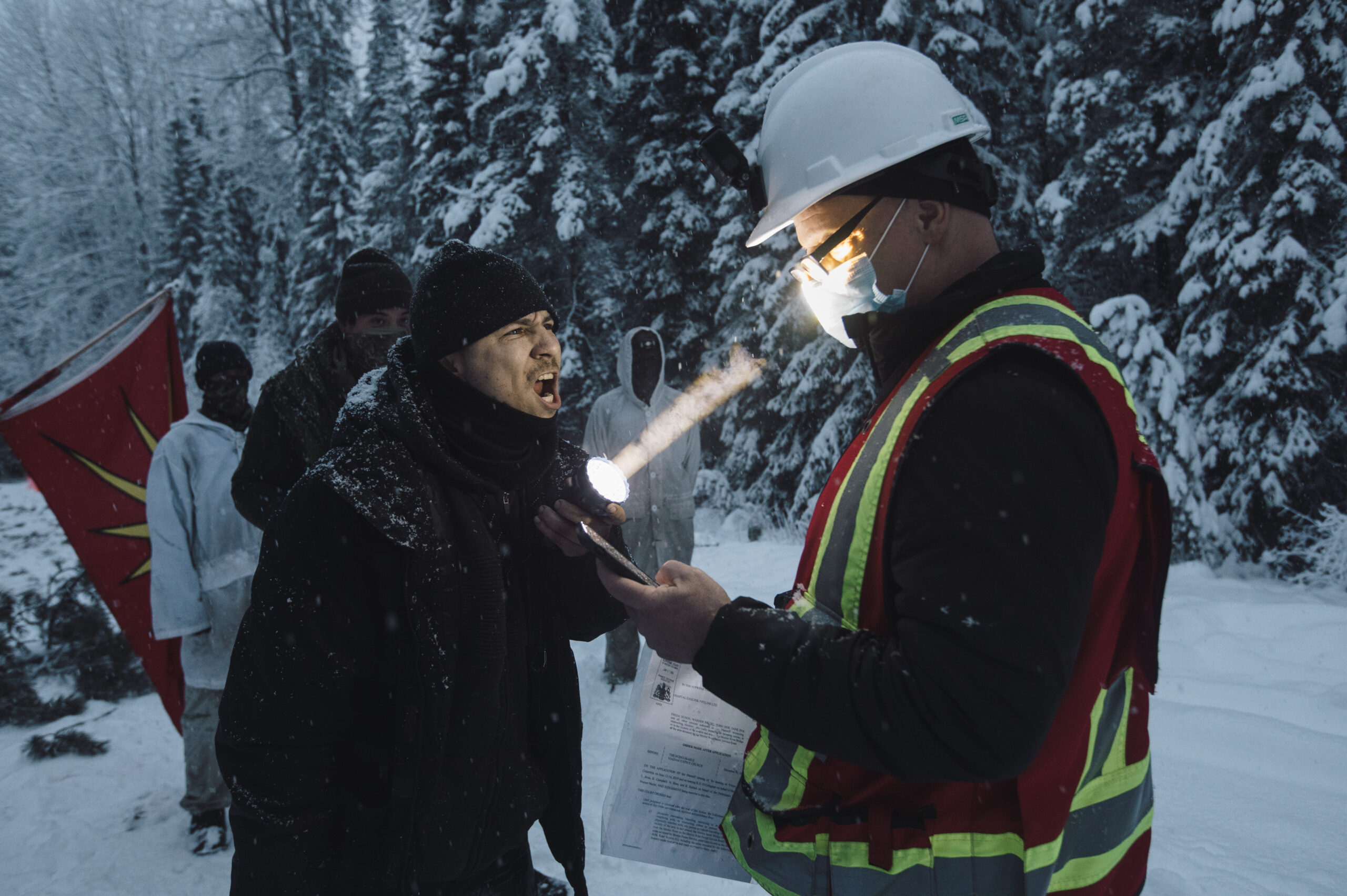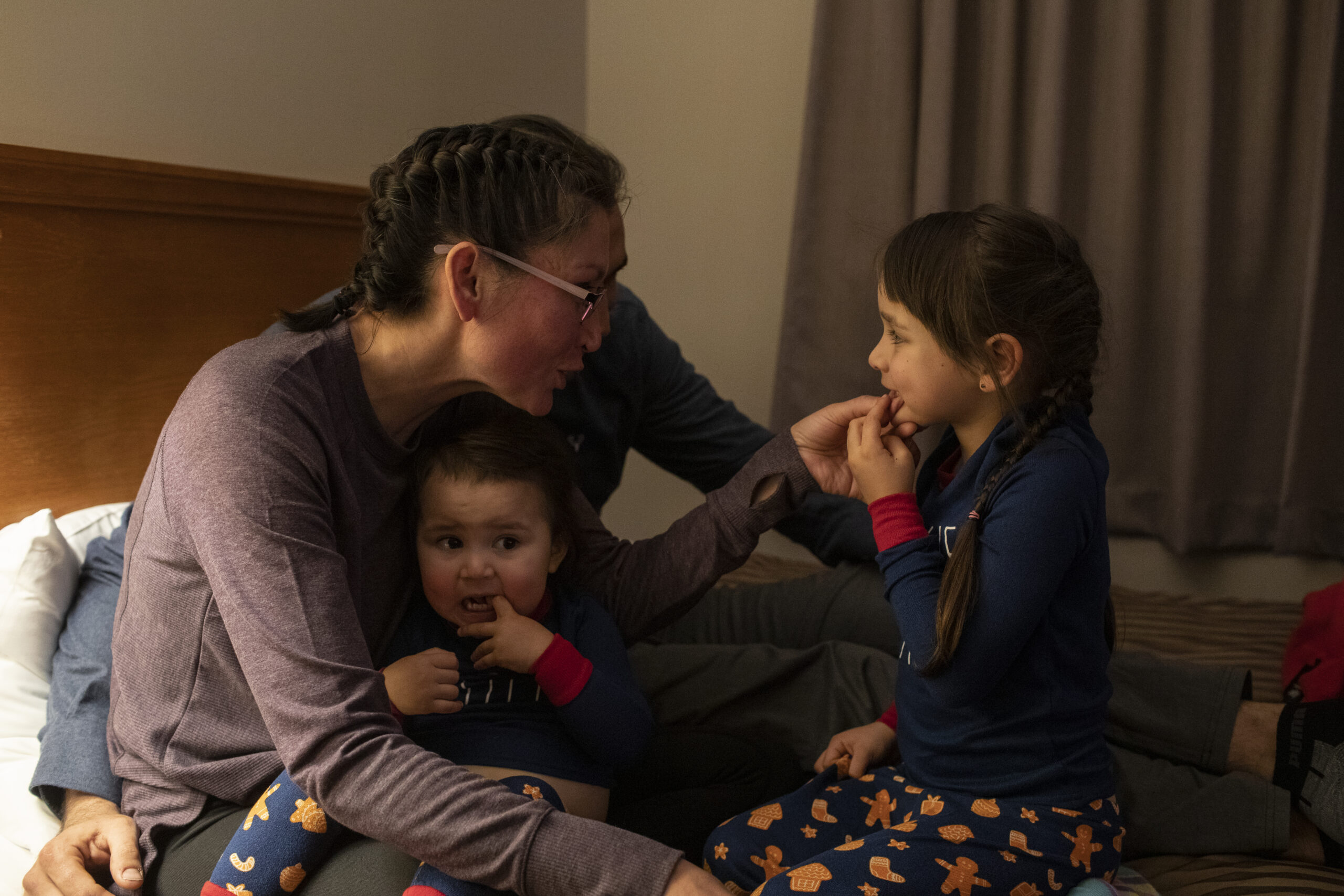
Bill 15: this ‘blank cheque’ legislation could dramatically change how B.C. approves major projects
Premier David Eby says new legislation won’t degrade environmental protections or Indigenous Rights. Critics warn...
This article contains a reference to residential schools that may be triggering. Support for survivors and their families is available. Call the Indian Residential School Survivors Society at 1-800-721-0066 or 1-866-925-4419 for the 24-7 crisis line.
B.C.’s attorney general will pursue criminal contempt charges against Indigenous land defenders and supporters arrested last November in northwest B.C. In a now-infamous RCMP raid on Wet’suwet’en territory — the third such operation in three years — heavily armed police enforced TC Energy’s court-ordered injunction issued against anyone impeding construction of their Coastal GasLink pipeline, arresting more than 30 individuals over two days.
On July 7, the province’s legal team told B.C. Supreme Court Justice Marguerite Church it would prosecute Sleydo’ Molly Wickham, Shaylynn Sampson (Gitxsan Lax Gibuu Wilp Spookxw), Teka’tsihasere Corey ‘Jayohcee’ Jocko and Hannah Hall. The decision brings the total to 19 individuals arrested during the raid that B.C. Prosecution Service will pursue criminal charges against in the coming months. The prosecution service operates independently of the governing party — the premier and ministers are intended to have no influence on the legal process and have no power in determining whether a particular prosecution or appeal should be undertaken. Those decisions lie with the attorney general, who is appointed by the premier to act independently.
The court invited the province’s prosecution service to pursue charges against land defenders and supporters after arrests in 2019 and 2020. This is the first time B.C. has agreed to proceed with prosecution — and so the first time land defenders could face prison sentences for their actions.
Those arrested say they were protecting Wet’suwet’en lands and waters and upholding sovereign Indigenous Rights and Title as per a 1997 Supreme Court of Canada ruling. The province and Mounties say they were participating in unlawful protest, breaching the terms of the B.C. Supreme Court injunction order.
“I’m really disappointed with the outcome, especially because three out of the four people that are now facing criminal charges are Indigenous people with a voice, the ones that have had a really strong voice,” Wickham told The Narwhal outside the Smithers, B.C., courthouse after the hearing.
The province declined to prosecute eight others, including Jocelyn Alec, daughter of Dinï ze’ (Hereditary Chief) Woos, on whose house territory the arrests were made. Among those facing criminal charges is her fiancée, Jocko, who was with her when both were arrested.
When making its assessment, provincial lawyers had to consider two things: the likelihood of securing a conviction and whether it’s in the public interest. The decision not to pursue charges against Alec and others hinges on the fact that the RCMP didn’t do enough to inform individuals about the nature and scope of the injunction order.
“They didn’t have a copy of it with them and they did not even make an effort to really tell people what it was about,” Frances Mahon, legal counsel for a majority of the land defenders, told The Narwhal.

Sworn affidavits the Mounties filed with the court affirmed that on Nov. 18, 2021, “Inspector Ken Floyd read the injunction at the 44 kilometer [sic] marker of the Morice West” Forest Service Road and “reread the injunction a second time at the same location.” The affidavits also affirmed that on the following day, deeper on the territory and at a location where land defenders were inside a cabin and tiny house, Floyd “read the injunction to the protestors barricaded” inside the two wooden structures at 11:30 a.m. and 11:46 a.m.
According to The Narwhal’s review of audio and video recordings, Floyd simply noted the existence of an injunction order and failed to provide details of the terms. Speaking about the charges that aren’t being pursued, B.C.’s prosecutor Tyler Bauman came to the same conclusion and told the court, “The script read by the RCMP was limited to road blocking and did not include the broader language of the injunction.”
The RCMP declined to speak with The Narwhal, noting: “Our actions and those of the individuals arrested are subject to a judicial process that we must respect.” The B.C. Prosecution Service declined to answer questions for the same reason.
Provincial lawyers will argue that the individuals now facing criminal contempt charges had either been previously arrested, and therefore could not claim ignorance of the contents of the injunction, or were active on social media in defiance of the court order.
As for the issue of whether prosecution is in the public interest or not, Mahon called it a “nebulous concept” but suggested a driving factor is “the integrity of the court is being called into question.”
Breach of the injunction is a civil matter, which means it’s between private parties, in this case between Coastal GasLink and the individuals alleged to have impeded construction. For civil contempt, the company’s legal team can choose whether or not to pursue charges. Now that the province is intervening on grounds of criminal contempt, the company is no longer involved and it becomes a public matter.
The company’s legal counsel, Kevin O’Callaghan, declined an interview request and referred The Narwhal to TC Energy, Coastal GasLink’s parent company. TC Energy did not directly answer The Narwhal’s questions and referred to a statement published on its website.
“Since December 2018, Coastal GasLink has dealt with numerous violations of enforceable B.C. Supreme Court injunctions from individuals who have engaged in escalating disruptive and dangerous actions,” the statement said.
“We are committed to delivering this critical energy infrastructure project and any risk to the safety of our workforce or others in the vicinity of the project route is of the greatest importance. Our work is fully authorized and permitted and has the unprecedented support of local and Indigenous communities across the project route.” (On Wet’suwet’en territory, the company has signed agreements with five of six elected band councils but the nation’s Hereditary Chiefs never consented to the project.)
Criminal contempt isn’t the same as a criminal charge for, say, theft or assault. Instead, it means the province believes “the accused knew … their conduct constituted a public defiance of a court order,” according to a B.C. Civil Liberties Association report. As the report notes, that public defiance can include breaching the terms of an injunction “in front of television cameras or on social media platforms, such as Facebook or Twitter.”
Neil Chantler, a defence attorney who represented numerous clients arrested at protests of the Trans Mountain pipeline, said the term “criminal contempt” is confusing.
“As soon as you’re encouraging, perhaps by your actions, other people to commit contempt of court, to disobey court orders, which the court of course relies on … you’re committing criminal contempt,” he explained.
“In these cases where there are so many people involved and the court’s integrity and authority is perhaps at greatest risk of being undermined because there’s almost a mass revolt against the authority of the court, the court invites the Crown to prosecute, as opposed to leaving it to the private party to prosecute.
If convicted, the individuals could serve up to 30 days of jail time, 150 hours of community service under the supervision of a probation officer or pay $3,000 in fines, according to sentencing positions filed with the courts.
“We are prepared to fully defend against the allegations,” Mahon said.
For Wickham, the escalation of charges from civil to criminal is in line with the history of colonization.
“All of the laws that have existed since contact with Indigenous people have been absolutely horrific and used for genocide,” she said. “It actually blows me away that people uphold colonial law in the way that they do — colonial laws put our kids in residential schools. They literally forced mass sterilizations and murder of children and babies. And those are the laws that are being upheld in this country.”
Murray Rankin, B.C.’s Minister of Indigenous Relations and Reconciliation, declined an interview request and the ministry referred The Narwhal to the prosecution service in response to questions.

Chantler said it’s important to remember that the province approved these projects that sit at the centre of conflicts.
“These environmental disputes, these resource extraction cases that have been before the courts so often in the last 10 years, are a failure of government, and the failure of government is a result of people voting for these governments.”
He added that he believes civil disobedience has its place, particularly when Indigenous Rights are in play.
“It does continue to raise awareness and it does shine a very bright spotlight on an issue,” he said. “People are willing to put their own liberty at risk and get arrested over these things. I think it’s a tremendous call and a real sacrifice to get arrested and potentially get a record and to potentially do time for a cause you believe in. But it’s a losing battle. I mean, at that point, all you’re doing is public relations, you’re not actually going to stop the project.”
Prior to the enactment of laws that now dictate what happens to those facing contempt charges, the Wet’suwet’en and other nations lived under complex governance systems for thousands of years.
“Our laws don’t mean anything to [Coastal GasLink], or to the courts or to, you know, most of mainstream society. It’s infuriating and frustrating,” Wickham said.
While visibly shaken, she wasn’t swayed by the decision.
“The whole criminalization process is meant to deter us from doing what’s right but I’m not going to be deterred from upholding our laws and protecting our land.”
Despite a steady stream of industry traffic and construction activity, coupled with the continual presence of police and private security, Wet’suwet’en community members and their allies continue to reconnect with the land, water and wildlife on the territory.
“Recently we had a young Indigenous person get his first kill out there,” Wickham said. “We tanned the hide with all the kids and processed all the meat and we’re going to have a ceremony for him to celebrate.”
She added Wet’suwet’en youth are helping build a balhats, or feast hall, at the confluence of Ts’elkay Kwe (Lamprey Creek) and the Wedzin Kwa (Morice River), which will provide a space for Elders and young families to connect with each other and the land.
“There’s all these beautiful moments and times and experiences, those little snippets of what it actually feels like to be who you are,” she said. “Those are the moments that keep Indigenous people’s spirits alive. I’d go to jail for that, for that one moment.”
Updated on July 19, 2022, at 7:07 a.m. PT: This story has been updated to clarify and add an explanation of the B.C. Prosecution Service’s role and relationship to the B.C. government, and to remove references to the B.C. ‘Public’ Prosecution Service. The prosecution service, and Crown counsel employed by it, act independently of Premier and Cabinet, as representatives of the attorney general.
Get the inside scoop on The Narwhal’s environment and climate reporting by signing up for our free newsletter. On a warm September evening nearly 15...
Continue reading
Premier David Eby says new legislation won’t degrade environmental protections or Indigenous Rights. Critics warn...

Between a fresh take on engagement and our new life on video, our team is...

The public has a few days left to comment on Doug Ford’s omnibus development bill....
